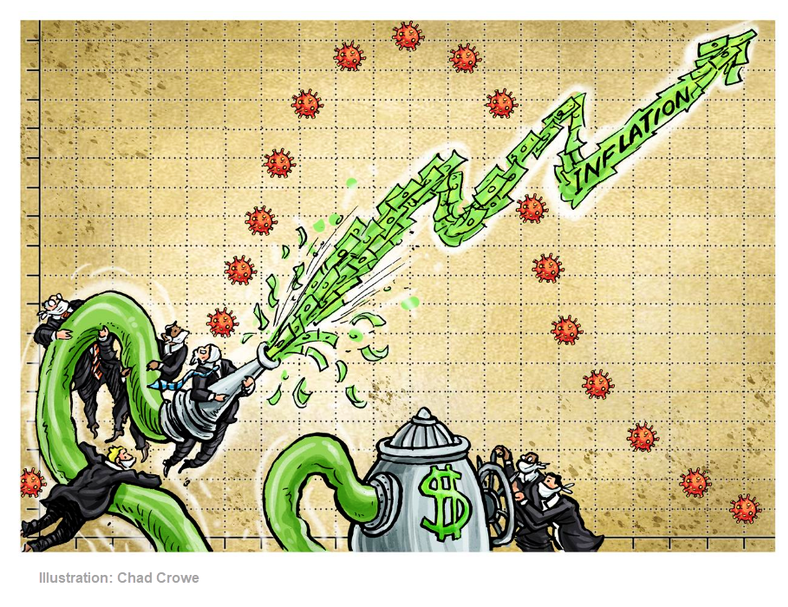
Get Ready for the Return of Inflation, says Tim Congdon, in a Wall Street Journal op-ed.
The economists Milton Friedman and Anna Jacobson Schwartz demonstrated in "A Monetary History of the United States" that a collapse in the quantity of money was the main cause of the Great Depression. Hoping to avoid a repeat, the Federal Reserve in recent weeks has poured money into the economy at the fastest rate in the past 200 years. Unfortunately, this overreaction could turn out just as poorly; history suggests the U.S. will soon see an inflation boom.
Friedman and Schwartz used a broad definition of the quantity of money that included all bank deposits, and found that U.S. money stock shrank by 38% between October 1929 and April 1933. Some prominent economists—including Princeton's Paul Krugman and Columbia's Joseph Stiglitz—claim that money growth no longer matters much, but they're wrong. After all, the 2007-09 recession showed that the ever-changing fortunes of the banking system have a significant effect on demand, output and employment. From 2010-18, growth rates of the quantity of money and nominal gross domestic product were virtually identical at 4% a year.Policy makers have repeatedly called the battle against the novel coronavirus a war. As in wartime, federal expenditures are rising sharply while tax revenues are being hit by the lockdown. Both World War I and World War II—and, indeed, the Vietnam War—were followed by nasty bouts of inflation. If that happens again, policy makers today being cheered for their swift, decisive action will instead have to answer for their grave lack of foresight.
Inflation View is Wrong
The inflation view espoused above is widely held. Some even call for hyperinflation.
However, the collapse in demand, dwarfs supply shocks and monetary printing.
The Fed Will Soon Need to Stem Deflation
Economist Tim Duy thinks along the right lines. Duy says The Fed Will Soon Need to Stem Deflation.
It was common early in the crisis to view the viral outbreak as a supply shock because, from the U.S. perspective, it appeared to be largely impacting the flow of goods from China. This original view suggested an inflationary impact from the virus.
The demand-side impact, however, now clearly dominates the economic outlook. Shutting large portions of the economy resulted in a collapse in spending and surging unemployment.
Not only do we have a collapse in demand, but the eventual rebound in activity is likely to be anemic, too.
The result will be a protracted, substantial output gap that will weigh not only on inflation but inflation expectations as well. That shift in expectations will weigh on demand. For instance, a student recently asked me if I thought this was a crazy time to buy a car. I said it would be better to wait a few months for prices to come down instead.
What About Wage Pressures?
Duy cited this interesting point from the recent Fed Beige Book of economic conditions.
No District reported upward wage pressures. Most cited general wage softening and salary cuts except for high-demand sectors such as grocery stores that were awarding temporary "hardship" or "appreciation" pay increases.
Deflation Summation
Demographics
No wage pressures
Falling demand
Anemic rebound
Eurozone basket case supports the dollar
I find it amusing that people get huge inflation worries out of that mix.
Inflation Targeting Silliness
But Duy misses the boat too on one point.
Still, watch for deflation concerns to eventually reveal themselves in increasingly strong language reinforcing the Fed's commitment to a 2% inflation target followed by forward guidance to more strongly lock in expectations that the central bank will not reverse policy easing anytime soon.
Duy is on the right track, but he failed to blame the Fed.
Very Deflationary Outcome Has Begun
A Very Deflationary Outcome Has Begun: Blame the Fed
Economic Challenge to Keynesians
Of all the widely believed but patently false economic beliefs is the absurd notion that falling consumer prices are bad for the economy and something must be done about them.
My Challenge to Keynesians "Prove Rising Prices Provide an Overall Economic Benefit" has gone unanswered.
BIS Deflation Study
The BIS did a historical study and found routine deflation was not any problem at all.
"Deflation may actually boost output. Lower prices increase real incomes and wealth. And they may also make export goods more competitive," stated the BIS study.
Deflationary Outcome
Deflation is not really about prices. It's about the value of debt on the books of banks that cannot be paid back by zombie corporations and individuals.
That is what the Fed fears. It takes lower and lower yields to prevent a debt crash. But it is entirely counterproductive and it does not help the consumer, only the asset holders. Fed (global central bank) policy is to blame.
So prepare for another round of debt deflation, possibly accompanied by a lower CPI especially if one accurately includes home prices instead of rents in the CPI calculation.
For a discussion of the BIS study, please see Historical Perspective on CPI Deflations: How Damaging are They?
Inflation targeting is one of the reasons why we are in such a mess for the third time in 20 years.
Bubbles are Inherently Deflationary
It's asset bubble deflation that is damaging, not routine price deflation.
When asset bubbles burst, debt deflation results.
Here we go again as Hyperinflationists Come Out of the Woodwork Again.
Commenti
Posta un commento